WASHINGTON, D.C. -- Largely considered untested when elected, Pakistan's President Asif Ali Zardari has been engulfed by crisis since he took office a few months ago. A ���۴�ýPoll of Pakistan in October, before the latest crisis with India, revealed the new leader had failed, as of that point, to earn more support than his predecessor: Zardari's 19% job approval rating was on par with the 17% approval that Pakistanis gave an unpopular President Pervez Musharraf in June.
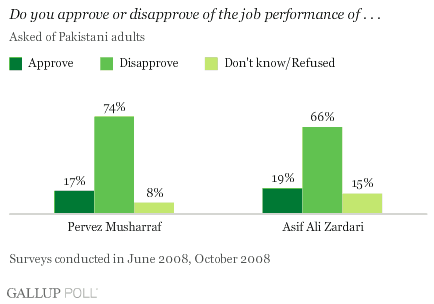
Zardari's election in September signaled Pakistan's complete return to civilian rule after nearly a decade under military control. And although the widower of slain Pakistani leader Benazir Bhutto entered office with a tarnished reputation and little experience, many Pakistanis' hopes were pinned to Zardari's ability to bring political and economic stability to the nation and successfully return it to democracy.
When ���۴�ýpolled Pakistanis a month later, they were still mired in the country's worst economic crisis in a decade and had just suffered one of the worst terrorist attacks on their own soil. Fifteen percent of the population hadn't formulated an opinion about his leadership yet, but few approved of the job their new president was doing or expressed confidence in his abilities. Only 13% of Pakistanis said they were confident Zardari would be able to improve the lot of his people, while 62% said they were not.
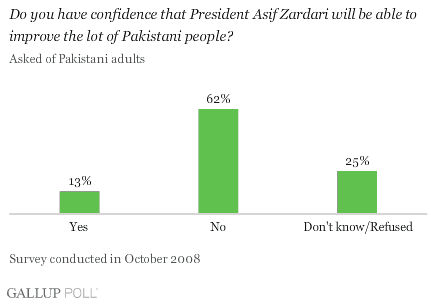
Outside Sindh province, a support base for the ruling Pakistan People's Party and Zardari's birthplace, the new president has fewer admirers. While 39% of Sindh residents approved of Zardari's leadership, his approval was 20% in Baluchistan, 12% in Punjab, and just 7% in North West Frontier Province (NWFP). Twenty-nine percent in Sindh said they were confident he can better Pakistanis' lot, while 9% in Baluchistan, 8% in Punjab, and 2% in NWFP said this.
Wrong Direction
One challenge for Zardari may be that a majority of Pakistanis still believe, as they did in June, that their country's leadership is taking their nation in the wrong direction. Two-thirds of residents said in October that the leadership of Pakistan was taking the country in the wrong direction, while just 10% said it was leading it in the right direction.
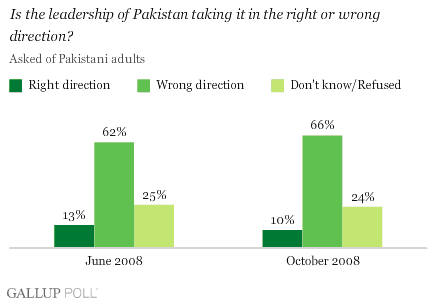
While perhaps waxing nostalgic for better economic times under Musharraf, a sizable 28% of Pakistanis reflected in October that Musharraf had led the country in the right direction. However, the plurality of Pakistanis (45%) said Musharraf led Pakistan in the wrong direction.
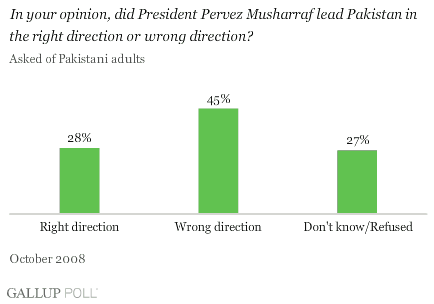
Confidence in Institutions
After years of military rule, Pakistan's civilian government and institutions remain relatively weak, as does Pakistanis' confidence in them. Of the social and political institutions tested in October, majorities of Pakistanis expressed confidence in just two -- religious organizations (81%) and the military (67%).
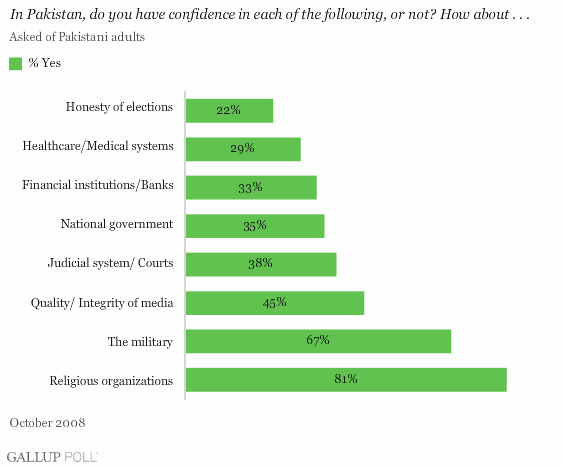
With the exception of confidence in religious organizations, which has increased since ���۴�ýstarted asking these questions in 2005, Pakistanis' confidence in most institutions has waned or failed to improve. Any erosion is problematic for Pakistan's sustainability and future growth.
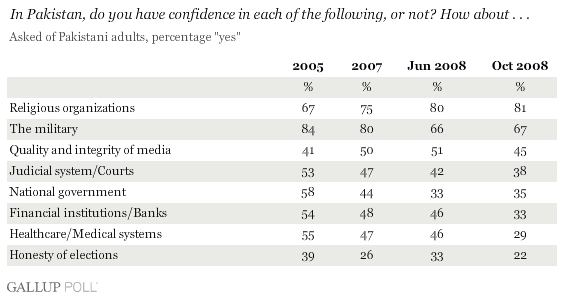
Looking Ahead
Weak civilian governance, economic vulnerability, the spread of domestic terrorism, and brittle relations with India will continue to threaten Pakistan's stability in the near-term, which of course has tremendous regional and international implications.
But if the government is looking to rally Pakistanis and unify them to build the modern, progressive, egalitarian, and democratic country that Zardari has spoken about, it must restore the people's faith in the country's leadership and institutions. Pakistanis' lack of trust in the country's fragile civilian leadership at the time of the October survey revealed a perilous disconnect that could hamper true progress. It will be interesting to find out from Gallup's surveys in Pakistan after the crisis with India and beyond whether the relatively weak government will be able to bridge that chasm and build the domestic support it needs to strengthen its position.
Survey Methods
Results are based face-to-face interviews with approximately 840 adults, aged 15 and older, conducted in October 2008 in Pakistan. The survey did not include the Federally Administered Tribal Areas or Azad Jammu and Kashmir. The excluded area represents about 5% of the population. For results based on the total sample of national adults, one can say with 95% confidence that the maximum margin of sampling error is ±5 percentage points. In addition to sampling error, question wording and practical difficulties in conducting surveys can introduce error or bias into the findings of public opinion polls.
